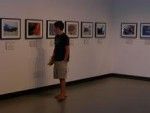Snapshots of Interrupted Lives

Upon inspection of the photographs displayed by Benjamin Busch in the Clifford Art Gallery, images of conflict, poverty and obscurity may meet the eye, but Busch discourages this view. The pieces in “The Art of War” and “Occupation” were photographed in 2003 and 2005 during Busch’s two separate tours in Iraq.
“These are not war photographs,” Busch stressed in a lecture given September 5 in the Golden Auditorium. “They are only abstractions that I was able to capture as I passed through a certain time and place. I tried to record Iraq at a pivotal moment between its dissolving past and uncertain future.”
And, while many Iraq veterans have few reservations expressing their personal feelings on this war, Busch refuses to let his art have a partisan message attached.
“My photos are not pro-war or anti-war,” Busch explained. “They do say that it was war, it was Iraq and we were there.”
Before introducing selections from the two exhibitions, Busch introduced himself and the complex purpose behind his art to the audience in the crowded auditorium.
In 1991, Busch earned a degree in Studio Art from Vassar; he joined the U.S. Marine Corps soon after. Busch has played Officer Colicchio in HBO’s The Wire and he is currently acting in a new television series on the Iraq war called Generation Kill.
Having said this, Busch proceeded to show two photographs of himself, one while on tour and the other while on the Generation Kill set.
“Apparently they thought I looked better dirtier,” Busch said, remarking on his dark make-up in the second photo.
Launching into a showcase of his two exhibitions, Busch opened with a photograph called “Fire and Night.” This haunting image shows an obscure, dark figure against a violent orange flame licking the night sky. The photo, restricted by other images surrounding the fire, is intentionally limiting in its viewpoint.
Elaborating on this theme, Busch transitioned the audience to the inside of a combat patrol. Describing the weight and constriction he felt within his uniform, he further illustrated the discomfort with a portrait of the restricted perspective that the windshield of a car provides from the back seat.
“Later that year, when I was back in New York City, I was reminded of this image and took this,” Busch said, showing a nearly identical photograph from the back of a taxi cab called “Ten.”
“This photograph is about perspective, and mine really doesn’t change at all,” Busch said.
Another striking photograph depicts a series of mug shots on two separate posters, taken from a criminal records room.
“They are formally taken, formally ordered,” Busch noted. “Not at all intended to be the collage of identities we see here.”
A similar photograph was later shown of an Iraqi headshot burning in a trashcan. Unlikely portraits were a prominent theme of Busch’s of work, and this burning head of both a man and a war captured that perfectly.
One photograph called “The Disappeared” was more premeditated than the other fleeting moments. A group of Iraqi men stood watching the camera, with hands outstretched holding photographs.
“This photograph doesn’t show the skeletons at the feet of these men looking for their relatives,” Busch said. “The news would have done just that.”
When asked during the question and answer session how he felt about the depiction of the Iraq war in the U.S. media, Busch responded without hesitation that he felt wronged.
“The news has betrayed us all,” Busch said. “It’s been an interesting ad campaign, and it’s certainly not the press of old. It depends on what you see, what you know. You have to ask the question, ‘What does America care about?’ ‘Do they give a damn?’ It seems like if it bleeds, it leads.”
With the final photographs of the showcase, Busch displayed pieces depicting his fellow soldiers. One photo, of a Marine named John, was another in a series of unlikely portraits. The last photograph showed an overturned army truck engulfed in flames.
“John’s remains are under that truck,” Busch said in a softer tone.
“This is the only photo that I don’t have for sale. Of course, it’s the only one the press wants. I’ve showed you what it’s like to be an artist in war,” Busch concluded. “But every day, this is what it’s like to be a Marine.”
Benjamin Busch’s two exhibitions, “The Art of War” and “Occupation,” are on display through October 21. The images described here are only a few in a series of many that are well-worth viewing.



